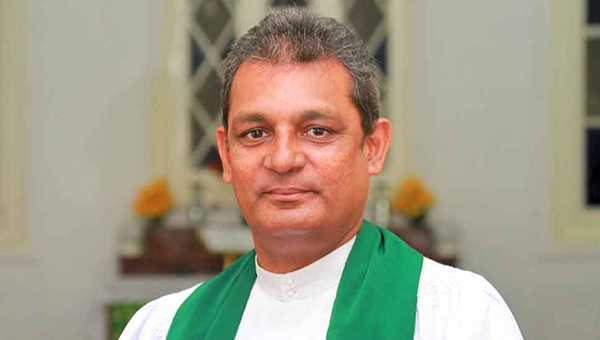‘LEAD LIKE JESUS…’
Sermon Preached by the Rev’d Marc Billimoria,
Warden of S. Thomas’ College, Mount Lavinia
at
the Episcopal Ordination and Installation
of
The Reverend Dushantha Lakshman Rodrigo
as
16th Bishop of Colombo
on
The Feast of St Simon &St Jude
28th October 2020
The Cathedral Church of Christ the Living Saviour
Colombo

May I speak in the name of God: Father, Son and Holy Spirit. Amen.
I was deeply moved to have received Father Dushy’s invitation to preach on this occasion on the very evening of his appointment by Archbishop Justin exactly one month ago, and I am glad to be doing so for a couple of reasons.
When the Diocese of Colombo celebrated its centenary in 1945 the Rev. Lakdasa de Mel, an old boy of Royal College, became the first Sri Lankan to be consecrated an Anglican Bishop. This year, in its 175th year, in Fr Dushy our Diocese, at long last, receives its first Thomian Bishop and as the present Warden of S. Thomas’ College I am particularly honoured to preach on this historic occasion.
Founded by Bishop James Chapman to serve as the Divinity School for his new Diocese, over the years S. Thomas’ has produced many priests but no Bishop until now. I am also of course very glad to be here to support one who has been a friend and colleague in ministry for many years. So, thank you Father D for your gracious invitation to share the joy of this day with you and Shehara and the entire Diocese as you begin your journey as our 16th Bishop.
My text this afternoon is an excerpt from the Epistle chosen for this service (Ephesians 4: 11, 12) – “The gifts he gave were that some would be apostles… to equip the saints for the work of ministry, for building up the body of Christ…”
According to Luke 6:13, Jesus chose twelve disciples, including St Simon and St Jude, who we remember today, and commissioned them to be Apostles, to go into the world to proclaim his Gospel, to serve people and to point the way to God. After Jesus’ Ascension the Apostles passed on the Apostolic Office and Ministry to their successors, the first Bishops according to some Church Fathers.
Anglicans believe that Bishops therefore are called to guard the apostolic “good deposit of faith” and to give visionary leadership to the Church to fulfill God’s Mission. Whether or not everyone agrees with this view of Episcopacy, all can agree with St Paul that apostolicity, among the other ministries, is a gift of the Spirit – “to equip the saints”, the whole baptized people of God, for “building up the Body of Christ”, the Church, for “the work of ministry”, the task of mission.
The nature of episcopal ministry has changed over time and today an Anglican Bishop is expected to multi task. I will not repeat what is stated in the Declarations of the Ordination Liturgy about the multifaceted role a Bishop is called to play. I want to however, share with you Father Dushy the words of the Lambeth Fathers of 1988 who expressed it well when they agreed that a Bishop is not just “A symbol of Unity…a teacher and defender of the faith, a pastor of the pastors and of the laity, an enabler in the preaching of the Word, and in the administration of the Sacraments, a leader in mission…a shepherd who nurtures and cares for the flock of God” but one who is also called to be,
“a physician to whom are brought the wounds of society;
a voice of conscience within the society in which the local Church is placed;
a prophet who proclaims the justice of God in the context of the Gospel of loving redemption;
a head of the family in its wholeness, its misery and its joys…the family’s centre of life and love.”
All this points to the fact that fundamentally a Bishop’s ministry is a very personal one in which he must foster a personal touch by walking alongside people– all who know you will agree that God has blessed you with the ability to do this.
This is the need of the hour, because you assume the mantle of Bishop of Colombo at a challenging time. We are not just in a world changed forever by Covid-19 but one in which many people are being dehumanized in a multitude of ways, as described for instance by Pope Francis in his recent Social Encyclical Fratelli tutti.
It is in the midst of some harsh realities that you are called to lead the Church in this Diocese to reflect God’s concerns and priorities as we engage in God’s Mission. Father Dushy, you share a name with one of our Church’s most courageous theologians, Bishop Lakshman Wickremesinghe. Addressing the CMS in 1979 on the subject Mission, Politics and Evangelism Bishop Lakshman said, “The kingdom of God comes on earth not only when individuals are converted to Christ but also when society lives more in accordance with the values of this kingdom.” Herein lies a challenge to us even today. Our message is not just about personal salvation, as vital as that is, but also one of hope in the renewal of Creation through the incarnation, life and work of Jesus: God’s way of perfecting a world which God always sees as ‘good’ however ‘bad’ we make it. This is why for Anglicans Mission is not just evangelism but is seen in the broader context of the Marks of Mission. But if the Church is to engage in this kind of holistic and integral Mission there is need for honest self-scrutiny and a radical change of direction in order that we may be a certain kind of Church:
❖ A Church that is a sacramental and eucharistic community that worships God for God’s sake, (not just to satisfy the individual and relative tastes of the worshippers), and allows all worship to be the springboard for Mission.
❖ A Church that proclaims the Reign of God as Jesus did; preaching and teaching the Gospel of wholeness and abundant life.
❖ A Church in which childlike faith will not be viewed as a threat to intellectual pursuits and vice versa, that through its processes of formation calls its members, both clergy and laity, to lives of integrity and simplicity, intentional discipleship and authentic spirituality.
❖ A Church that as an “extension of the Incarnation” celebrates diversity, and honours difference by being an inclusive community in which ALL will be welcome and no one will be excluded on the basis of any of the narrow distinctions that continue to divide human beings. So a Church that will “seek the lost”, “bring back the strayed’, “bind up the injured” and “strengthen the weak” as the Prophet Ezekiel said God would do.
❖ A Church that is a living organism rather than a religious system or organization. One that is not, what Bishop Lakshman called “a captive church” but one freed from the chains of hierarchy and bureaucracy, in which Mission is given the priority over the long term interests of “the ecclesiastical establishment”. A Church then that is truly a Movement of the Spirit than a Monument to past glory!
❖ A Church that promotes within itself and in society at large the radically Christian principles of liberty, fraternity, equality, and mutuality while upholding democratic values and working for truth and reconciliation, peace with justice.
While you will undoubtedly value the inheritance of the past, and build on foundations laid by your predecessors over 175 years, you will need to ensure our living faith continues to be relevant by taking the Gospel of generosity, love and grace directly to where the people are and where life happens.
All this is a pretty tall order Father Dushy. The task is demanding and will require of you, in words attributed in the context of episcopal ministry to Rowan Williams, “the constitution (or stamina) of an ox and the skin of a rhinoceros”!
But the task will also require you to adopt a leadership lifestyle that is in line with that of Jesus’, the Fount of all Ministry and the only authentic model of leadership for the Church. Lesslie Newbigin defined a Bishop as one who so follows “Jesus in the way of the cross that others find it possible to follow too…” So look unto Jesus and lead like Him.
❖ Lead like Jesus, who had absolutely no confusion about the true nature of his Mission – He came to serve, not to be served and was not afraid “to spend and be spent” in His work, which, as Bishop Chapman said, is the “greatest and best privilege.”
❖ Lead like Jesus, “the human face of God”, who reflected God’s radically inclusive love for all people, at all times and in all places and be a true People’s Bishop.
❖ Lead like Jesus, patient and faithful in your relationships, courageous and consistent in decision making, remembering to be “like the serpent keen and wise, harmless as a dove” when bringing change where change is needed, especially if you need “to uproot and tear down…to build and to plant.”
(Jeremiah 1: 10).
While exercising the episcopal ministry of oversight you will often feel lonely, BUT, you will not be alone. Remember that God will be with you and grant you all the grace necessary to fulfill the demands of God’s Call. You will have the ever faithful Shehara by your side, and you will also have the support, solidarity and prayers of all of us.
We Anglicans describe ourselves as “episcopally led and synodically governed.” The word “synod” is said to be derived from a Greek word meaning “walking together” and so we believe that while exercising your unique apostolic ministry you will walk together with us, your fellow workers, in consultation and collaboration, affirming and encouraging us to use the gifts and talents with which God has endowed us. This will not only enhance our unity and collegiality but also our credibility.
What the Church in this country needs now more than ever is this sort of radical leadership that will show people Jesus, when they ask you, as they did the first Apostles, “we wish to see Jesus.” (John 12: 21) By leading like this you will be “equipping the saints for the work of ministry, building up the body of Christ…” and the Church will fulfill its true calling of bringing the light of the unchanging Gospel to an ever changing world.
I want to end with some words from the old Prayer Book Ordinal my dear brother as you take up the pastoral staff of our Diocese today:
“Be to the flock of Christ a shepherd, not a wolf; feed them, devour them not. Hold up the weak, heal the sick, bind up the broken, bring again the outcasts, seek the lost. Be so merciful, that you be not too remiss; so minister discipline, that you forget not mercy; that when the Chief Shepherd shall appear, you may receive the never-fading crown of glory.”
May God who has called you to this ministry journey with you from this day and beyond.
Amen.






